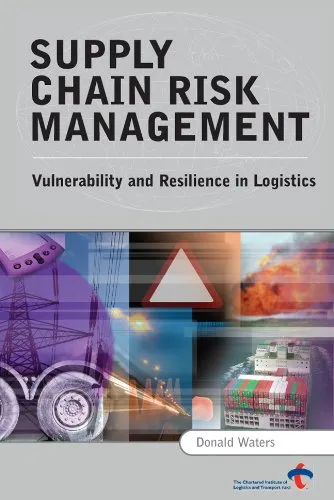Supply Chain Risk Management: Vulnerability and Resilience in Logistics
4.3
Reviews from our users

You Can Ask your questions from this book's AI after Login
Each download or ask from book AI costs 2 points. To earn more free points, please visit the Points Guide Page and complete some valuable actions.Introduction to Supply Chain Risk Management: Vulnerability and Resilience in Logistics
In today's interconnected and rapidly changing global environment, supply chains are becoming increasingly complex and, as a result, more vulnerable to disruptions. "Supply Chain Risk Management: Vulnerability and Resilience in Logistics" is a comprehensive guide to understanding the risks inherent in supply chains and provides valuable strategies to build resilience in the face of uncertainty. Written by Donald Waters, this book focuses on equipping readers with the tools and knowledge needed to identify, assess, and mitigate potential risks while ensuring continuous operational success.
From natural disasters to geopolitical tensions, economic uncertainties to cyber threats, this book delves deeply into the myriad of factors that can disrupt supply chains. It bridges the gap between theoretical insights and practical applications, making it invaluable for logistics professionals, supply chain managers, risk management experts, and students alike. By highlighting how vulnerability in logistics can be addressed through proactive strategies, "Supply Chain Risk Management" stands as a vital resource for navigating the evolving challenges of modern commerce.
Detailed Summary of the Book
The book provides a structured approach to understanding risk and resilience in supply chains. It opens with the fundamentals of risk management, emphasizing how globalization and interconnectivity heighten vulnerabilities. The book then explores the types of risks supply chains face, including operational, financial, geopolitical, and cybersecurity risks. Each risk is analyzed in-depth, supported by real-world examples that illustrate how these issues have impacted organizations globally.
A key strength of the book lies in its holistic approach to resilience. It does not merely focus on avoiding risks but emphasizes the importance of adaptability and recovery. Concepts such as redundancy, flexibility, and collaboration are thoroughly examined to demonstrate how organizations can continue to operate even in adverse conditions. Furthermore, the book provides models and frameworks for assessing risk at different levels, from organizational to inter-organizational supply chains.
In addition to discussing challenges, this book dedicates substantial attention to solutions. Topics like supplier diversity, scenario planning, use of technology, and crisis communication are presented with actionable insights. Overall, the text aims to empower professionals to design resilient supply chain networks that can withstand unforeseen events while maintaining efficiency.
Key Takeaways
- Understanding the complexity and interconnectedness of modern supply chains and the associated risks.
- Frameworks and tools to assess and manage risks in logistics and supply chain operations.
- Strategies to enhance resilience, including redundancy, flexibility, and fostering collaborative relationships with stakeholders.
- Practical insights on leveraging technology and data to predict, monitor, and address disruptions.
- Case studies showcasing lessons learned from real-world supply chain disruptions and recoveries.
Famous Quotes from the Book
"In a world of perpetual uncertainty, the ability to anticipate and adapt is what turns vulnerability into a competitive advantage."
"Risk in logistics is not something to fear; it is something to understand, manage, and ultimately thrive upon."
"Resilience is not born from rigidity but from the flexibility to bend without breaking."
Why This Book Matters
The globalized nature of modern supply chains means that disruptions in one part of the world can have ripple effects across continents. Organizations that fail to acknowledge and prepare for these risks risk losing millions in revenue, damaging their reputations, and severing long-standing customer relationships. "Supply Chain Risk Management: Vulnerability and Resilience in Logistics" is more than just a book; it is a blueprint for building sustainable, adaptable, and resilient supply chains.
What sets this book apart is its focus on practicality. Rather than presenting abstract ideas, it introduces actionable solutions backed by case studies and proven methodologies. For practitioners, it serves as a guide to implementing effective risk management strategies. For academics and students, it provides a strong theoretical foundation alongside practical applications.
In a world where disruptions are inevitable, this book equips leaders with the mindset and tools to navigate uncertainty and emerge stronger. Whether you are managing a single warehouse or overseeing a global logistics network, the principles outlined in this book are universally applicable and increasingly relevant in today’s volatile environment. It underscores the importance of resilience not just for survival but for thriving in a competitive marketplace.
Free Direct Download
Get Free Access to Download this and other Thousands of Books (Join Now)
For read this book you need PDF Reader Software like Foxit Reader


